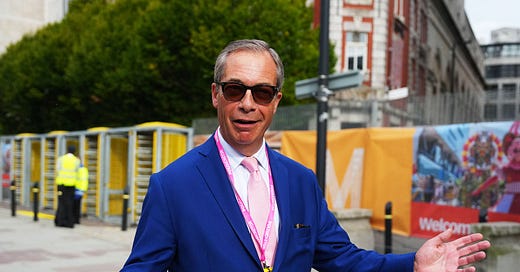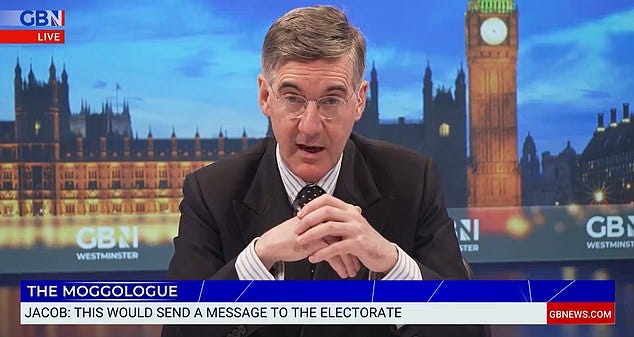We need to talk about Nigel
Conservatives who think Farage could be a saviour if he was invited back to the party he left 30 years ago are getting him wrong on several counts
Let me start with a pair of equal and opposite disclaimers. I’ve never voted for a Nigel Farage-led or -inspired party, whether the UK Independence Party, the Brexit Party or Reform UK. I don’t know Farage, don’t think I’ve met him and don’t especially want him to rejoin the Conservative Party. On the other hand, I don’t underestimate or diminish him. He has, to borrow from Liam Neeson, a very particular set of skills, and he has combined these with an undoubted rapport with some elements of the electorate to become one of the most significant British political figures of the 21st century. I mean that: his was a central contribution in bringing Euroscepticism from the powerless fringes into the mainstream, making the idea of the United Kingdom leaving the European Union one which could seriously and rationally be contemplated, and then in creating political circumstances in which the prime minister offered an in/out referendum. He also played a major part in the public mood which allowed the Leave campaign to score a narrow win. That is hugely significant.
Many of you will launch into heartfelt disquisitions of how baleful that influence has been, how terrible the result, how much you regret that Brexit won. That’s your privilege, but it’s not strictly speaking relevant: I’m not talking about the wisdom or otherwise of the public in voting as they did, but about Farage’s part in making it happen. It may even be reasonable to say that the 2016 referendum would not have come about without him. That will already have secured his place in the history books.
Farage’s career as an active front-line politician has been sporadic. He was a Member of the European Parliament for more than 20 years, from 1999 to 2020, under various flags, and was always a leading voice in the Eurosceptic movement, whatever formal office or title he held. But he sometimes led from the front: he was leader of UKIP from 2006 to 2009 and again from 2010 to 2016, and then leader of the Brexit Party from 2019 to 2021. And while he holds no formal active position in Reform UK, being honorary president, it does not take the sleuthing skills of Columbo to discover that he is the only “active person with significant control” in Reform UK Party Limited, as registered at Companies House. Reform UK is a Farage vehicle, and he has chosen for the moment to let official leader Richard Tice take the wheel. But do not mistake where the ultimate power lies.
In recent months, as the Conservative Party’s fortunates have continued to decline and Reform UK has gradually risen in support beyond 10 per cent, the idea has been floated that some deal could be struck whereby Farage would rejoin the Tories in some capacity—some have seriously mooted him as a future leader—and lend his distinctive style and appeal to their cause, averting electoral disaster. This week, former cabinet minister, Conservative MP and GB News presenter Sir Jacob Rees-Mogg used his television show to propose that the prime minister should agree an electoral pact with Reform UK and make sure that Farage, as well as some other leading members of Reform, are selected as candidates for the general election.
What we need is a big, open and comprehensive offer to those in Reform… the Prime Minister should offer candidate selection to senior members of the Reform Party, such as the estimable Ben Habib, Richard Tice, and of course, the one and only Nigel Farage. With the help of Nigel Farage in a Conservative government, as a Conservative minister, with Boris Johnson probably returning as Foreign Secretary, and welcoming the likes of Ben Habib and Richard Tice into the Conservative Party, as well as pursuing genuinely conservative policies, winning the next election is well within reach.
This is dramatic magical thinking, even by Rees-Mogg’s standards. Tice and Habib are not figures of any great weight in the grand scheme of things, while many people would agree that Boris Johnson was the worst foreign secretary of the post-war period during his last tenure of the office from 2016 to 2018. He was erratic, lazy, unreliable, careless and vague, and what he may have thought were refreshingly informal and ice-breaking jokes were regarded by others as quite woundingly offensive. Former Swedish prime minister Carl Bildt tweeted in 2018 that the United Kingdom “used to be a nation providing leadership to the world—now, it can’t even provide leadership to itself”.
The central conceit, however, that Farage’s involvement in Conservative politics could be transformative, is simply false, for several reasons. One straightforward consideration is how long it has been since Farage was a member of the Conservative Party. He joined in 1978, when he was a teenager, but left the party in 1992 in protest at John Major’s signing of the Maastricht Treaty. Bear that in mind, then: he was a Conservative member for 14 years, but it is 32 years since he left the party. In 1992-93 he was an early member of the Anti-Federalist League founded to oppose Maastricht by Professor Alan Sked, but then joined UKIP in 1993. So the idea that Farage becoming a signed-up Tory represents some sort of find homecoming really does not fit the facts.
More than that, there seems no clarity on what kind of role Farage would play if he were somehow tempted into the Conservative fold. Rees-Mogg’s suggestion that he could be given a ministerial role is baffling. There is absolutely no reason to think Farage would be in any way effective as a minister; his professional background is as a commodities trader at the London Metal Exchange, and while he may have been effective at this particular form of wheeler-dealing, he has never managed a large organisation—I classify leading UKIP more as an exercise in herding dysfunctional cats than corporate management—or been engaged in major policy delivery.
This is not at all to say that Farage has no skills. He is a first-rate campaigner and communicator, with a knack for devising simple, often simplistic, messages which represent some element of political truth and resonate with a significant number of voters. Allied to this, he has developed a public personality which is unaffected and ordinary: he appears not to be part of the political élite but rather just a member of the public like any other, finally daring to articulate what others had longed to say. Whether this is a conscious performance or simply his authentic manner, I don’t know. Largely it doesn’t matter, because it seems authentic, and it is very clear that many voters warm to him.
However, Farage is not a team player. Whether in UKIP or the Brexit Party, he has generally been the only significant, credible figure, an amused but determined campaigner largely indifferent to, although tolerant of, the strange collection of people around him. Which other major UKIP figures can you call to mind? Robert Kilroy-Silk passed through the party in 2004-05, spending nine months as a member but in that short time expressing ambitions towards the leadership. There was Paul Nuttall, a Merseyside footballer and teacher who led UKIP for a few months in 2016-17, wanted Al Gore’s climate change film An Inconvenient Truth banned from schools and expressed enthusiasm for the use of waterboarding. Or you might recall Godfrey Bloom, late of the Royal Corps of Transport, who declared feminism a “passing fashion”, rejected anthropogenic climate change and shouted “Ein Volk, ein Reich, ein Führer!” at German MEP Martin Schulz during a debate on the economic crisis in Ireland. It was unwise of David Cameron in 2006 to be heard dismissing UKIP as “a bunch of fruitcakes and loonies and closet racists”, but it was not a wholly unfair accusation.
The point here is that Farage has never been challenged. He has always been comfortably the biggest draw in his party, the most influential figure and the one to set its direction. He has never needed to exercise any discipline to fall into line with other people’s views, nor has he had to make the accommodations and elisions which are an inevitable part of collective responsibility. Indeed, he has conducted his career in a way in which plain speaking and occasional controversies are his method of operating.
It is also worth noting here that Farage himself has dismissed this idea of his becoming a Conservative again. On GB News, he was scathing about the party: “They give false hope to a silent majority and let us down every single time. There is no Conservative party, it does not exist.” And his view of the prime minister is poor in the extreme. “It’s just not going to happen because Rishi [Sunak] is not bold, he has no leadership whatsoever.” He had previously asserted, mockingly, that Conservative Party members would rather have him than Sunak as their leader, but he has never indicated that this is a serious prospect.
What we have, in conclusion, in Nigel Farage is a man who hasn’t been a Conservative for more than 30 years, who has shown no earnest interest in rejoining the party, has no skills to bring to a ministerial role and whose undoubtedly persuasive campaigning ability would not fit into a conventional political party, even if that party changed its policies wholesale to accommodate Farage’s beliefs. Simply, this will not happen, and yet it bobs to the surface of the media rock pool again and again.
There are two reasons for this. Firstly, there are enough Conservatives with sufficient public profile who are now so detached from reality that they persuade themselves of impossibilities like a messianic Faragiste arrival which transforms the party into one which reflects all of their political views and sweeps to election victory: Rees-Mogg is the most prominent of these at the moment but the idea has been raised by former prime minister Liz Truss, Conservative Democratic Organisation chairman David Campbell-Bannerman and “Minister for Common Sense” Esther McVey.
The second reason is that Farage, who is very far from a stupid man, is extremely adept at keeping the notion of his recruitment alive and bringing it to prominence every so often. It becomes, to an extent, a feedback loop, in that if someone mentions it in positive terms, that becomes a news story, which is then sufficient grounds to report on it, which in turn gives it renewed credence.
Nigel Farage is not the saviour of the Conservative Party. For him to rejoin it and be an effective senior member, let alone leader, would require both him and it to change their very natures in ways too profound to imagine. Of course the story will surface again and again, as some Conservatives seek solace from the reality of very bleak electoral prospects by imagining fanciful episodes of wish-fulfilment, and every time it does, Farage will fan the flames just enough to give it a few days of life before it subsides again. But it’s not to be taken seriously. If you really believe in the future of the Conservative Party, however disaffected you may have become, and you want to do anything positive towards restoring its fortunes, there are a million things more useful than daydreaming about Nigel Farage as your lord and saviour.





